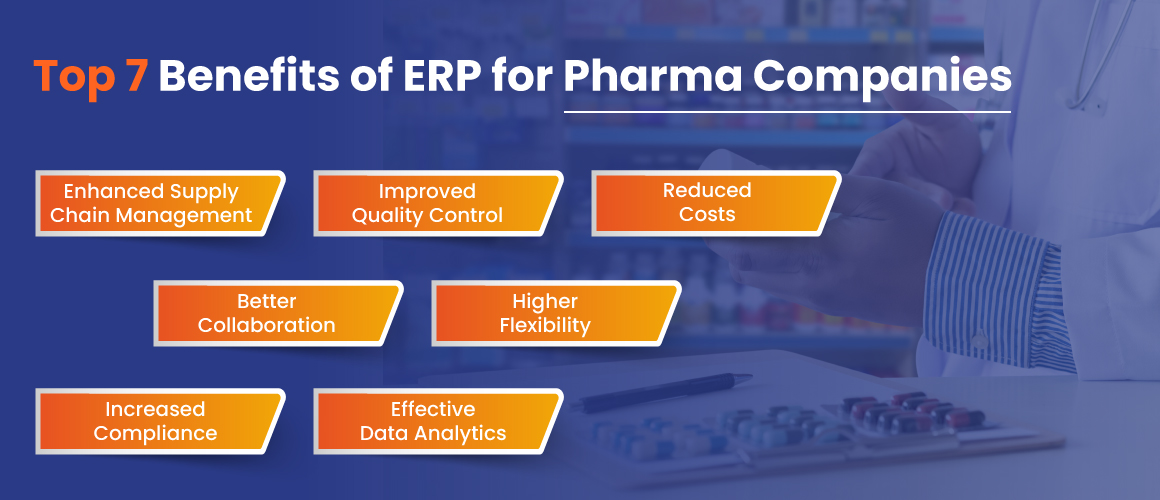Key Role of ERP for Pharmaceutical Industry in Addressing Challenges

An ERP (Enterprise Resource Planning) system can assist companies to coordinate various functions across different departments. Apart from manufacturing and retail industries, the pharmaceutical sector has emerged as a big beneficiary of ERP software. In this post, we will discuss the benefits of ERP for the pharmaceutical industry along with its implementation strategies.
Without further ado, let’s understand the challenges of a thriving pharmaceutical sector and the role of ERP in mitigating them.
Importance of ERP in Pharmaceutical Companies
The pharmaceutical industry focuses on the research, development, and manufacturing of drugs or medicines that are useful for treating diseases in people and animals. The scope of the pharmaceutical sector has widened in the post-pandemic age as it plays a more significant role in the government’s vaccination and other health-related programs.
It is, however, difficult to achieve growth while maintaining compliance with prevalent rules. As one of the highly regulated sectors, the pharmaceutical industry has to deal with complex processes and complicated business models. Moreover, the industry has to set and maintain standards in developing effective remedies for patients.
Here, ERP for the pharmaceutical industry lends a helping hand! It keeps all the team members from different departments on the same page every time to meet quality standards and deadlines. Pharma ERP software can also assist companies in keeping up with frequent regulatory changes and meeting the high demands of specific medicines.
Pharma companies can address various challenges while leveraging the benefit of automation and digitization with the help of an ERP solution.
Challenges in the Pharmaceutical Industry
The pharmaceutical industry is growing at a tremendous pace. As per the Statista prediction, the revenue in the pharmaceutical market is expected to grow at 5.80% on a y-o-y basis till the year 2028. In the US alone, the market is assumed to reach over $860 billion by 2028. Though the sector has shown unprecedented growth during and after the pandemic, it has a long way to go.
Let’s make a list of challenges for the pharmaceutical sector.
Maintain Quality
It is a highly crucial challenge in the pharmaceutical industry. All pharmaceutical products must be effective and consistent in results. However, when it comes to quality control, it is always difficult to ensure the accuracy of ingredients during the ongoing inspection and testing of finished products.
Lack of Flexibility
Unlike the manufacturing sector or chemical companies, the pharmaceutical industry has to remain very specific because a particular drug targets a niche subset of the population. Also, the intensifying competition and changes in regulations can affect the batch size for specific drugs. It reduces flexibility.
Disruption in Supply Chain
The pharmaceutical supply chain is more complicated and regulated as compared to other industries. As the supply chain involves many suppliers dispersed over different places, continuous monitoring and cooperation are essential. Even the slightest disruption in the supply chain can cause damage.
Data Analysis
A pharmaceutical company with a research facility generates a huge volume of data. The company management needs to analyze the data properly to get actionable insights and make quick decisions. However, it is not possible without digitization because of the complexity and abundance of data.
Repetitive Tasks
High regulations and stringent laws keep the pharmaceutical sector away from using advanced technologies. As a result, the sector mostly remains dependent on paperwork or manual processes. As a result, repetitive tasks can take much of their teams’ time daily.
Resource Optimization
The sector faces a shortage of skilled workforce along with fluctuations in operational costs and other internal issues. At times, cost considerations affect the hiring process and revenue. In such a scenario, resource optimization becomes difficult but essential for maintaining the workflow.
Along with these challenges, many companies face issues in marketing and retaining skilled workforce for a long time. A feature-rich ERP for pharmaceutical companies can assist you in addressing these challenges effectively and gain various benefits.
Benefits of ERP for the Pharmaceutical Industry

A pharma company can get many benefits from a robust ERP solution. Here we mention the top benefits of ERP for pharma companies.
Enhanced Supply Chain Management
ERP systems offer real-time visibility into the entire pharmaceutical supply chain, from procurement of raw materials to distribution of medicines.
Improved Quality Control
ERP for pharma companies helps you maintain strict quality control standards by automating batch tracking, expiration date monitoring, etc.
Reduced Costs
An ERP for pharmaceutical industry is designed to streamline operations and automate many manual tasks, leading to cost savings and improved efficiency.
Effective Data Analytics
ERP software can offer a centralized repository for enabling pharmaceutical companies to gain valuable insights into their business operations.
Better Collaboration
ERP breaks down silos between departments and facilitates collaboration across the pharmaceutical company for increasing productivity.
Higher Flexibility
ERP solutions can assist pharmaceutical companies of all sizes to meet specific needs and increase flexibility over the period.
Increased Compliance
Pharmaceutical companies operate under strict regulatory guidelines, and ERP systems can help them stay compliant by automating regulatory reporting.
An ERP system with all the necessary features for the pharmaceutical industry can take your business to a new level. You can grab opportunities more quickly with real-time decisions and reduce the risk of counterfeiting or related issues.
Let’s qo through some useful tips to select the right ERP system for your pharmaceutical company.
How to Choose an ERP System for the Pharmaceutical Industry?
Choosing the right ERP system for a pharmaceutical company is a critical decision that can have a significant impact on the company’s overall operations and success. Here are some key factors to consider when evaluating ERP for the pharmaceutical industry-
Industry-specific Functionality
Pharmaceutical companies face unique challenges and regulatory requirements. Therefore, an ideal ERP should have features like compliance management, recipe and formula management, quality management, and lot/serial number tracking.
Scalability
Pharmaceutical companies need an ERP solution that can scale with their growth, accommodating increasing volumes of data and expanding business operations. The system should be able to adapt to changing business needs and regulatory requirements without much effort.
Integration Capabilities
The right ERP system for pharmaceutical companies should seamlessly integrate with other enterprise applications such as CRM, supply chain management, and laboratory information management systems (LIMS). This integration ensures data consistency.
Vendor support
Pharmaceutical companies should choose a reputed and reliable ERP vendor that provides comprehensive support, including implementation assistance, training, and ongoing maintenance. A vendor with a strong track record in the pharmaceutical industry is preferable.
Total cost of ownership (TCO)
The TCO of an ERP system includes not only the initial purchase price but also the costs of implementation, training, maintenance, troubleshooting, and ongoing upgrades. It is crucial to evaluate the TCO of different ERP systems to make an informed decision.
Cloud vs. On-premise
Pharmaceutical companies should consider whether to deploy their ERP system on-premises or in the cloud. Cloud-based ERP systems offer more scalability and reduced IT overheads, while on-premises ERP systems provide more control over data and security.
Other aspects to choose the most suitable ERP software for your pharmaceutical company are reading case studies and checking user reviews.
ERP Implementation Strategies for Pharmaceutical Companies
Most ERP implementation strategies and processes have some steps in common including ERP evaluation, project preparation, ERP system design, ERP system build, testing, and Go-Live. Here are the different ERP implementation strategies from the perspective of the pharmaceutical industry:
Big Bang Implementation
It is a high-risk, high-reward approach that involves deploying all ERP modules across the company at once. Though it offers a quick implementation facility, it has a high risk of failure.
Phased Implementation
It is a more cautious approach that involves step-by-step deployment of ERP modules. It is better for pharmaceutical companies because it gives more time to train employees and causes less disruption to business operations.
Parallel Implementation
This strategy involves running both the old and new ERP systems simultaneously for a period of time. It brings minimal disruptions to processes and enables pharmaceutical companies to switch to an advanced ERP without much difficulty.
Pilot Implementation
The Pilot ERP implementation strategy involves implementing an ERP system in a limited scope, such as a single department. Companies that want to test the waters before committing to a full-scale implementation prefer this demo-type strategy.
Hybrid ERP Implementation
It is a combination of the other implementation strategies. This strategy is often favored by Companies with complex business processes or multiple locations prefer this strategy to reduce risks and increase efficiency.
The best ERP implementation strategy for a pharmaceutical company will depend on its specific needs and circumstances. However, all companies should consult a reputed ERP solution provider before making a decision.
How ERP Drives the Future of the Pharmaceutical Industry
We can certainly expect that the use of ERP systems in the pharmaceutical industry will continue to grow in the future. This is due in part to the increasing complexity of the processes and the need for pharmaceutical companies to be more efficient and compliant.
ERP will take an active part in fostering innovation in the R&D and reducing operational costs. As the pharmaceutical sector continues to evolve, the ERP solution will act as a catalyst. It will drive the growth of pharmaceutical companies by bringing automation and transforming processes digitally.
How Can Silver Touch Help You?
Silver Touch is your one-stop destination for custom ERP solutions. We assist you in simplifying processes for your pharma business with advanced Pharma ERP software. As a leading ERP solution provider with over 25 years of domain experience and an Official SAP Partner, we know what it takes to make sophisticated ERP for the pharma industry.
Here are some of the reasons why Silver Touch is your preferred ERP partner for a pharmaceutical company.
- Over two decades of domain expertise
- All ERP services under one roof
- Dedicated in-house team of experienced developers
- Global presence with CMMI Level 5 Appraised company
- Trusted partner for many companies ranging from startups to large enterprises
Do you want to know more about our ERP for pharmaceutical companies? Just shoot a message at info@silvertouch.com and we will get back to you soon.
Conclusion
ERP for pharmaceutical companies remains indispensable providing its ability to address the unique challenges of this sector. ERP solutions are useful for regulatory compliance, batch tracking, supply chain management, R&D support, and other processes of the pharmaceutical company. All you need to find the most suitable pharmaceutical ERP software for your company and ensure its proper implementation to leverage all the benefits for your business.
ERP for Pharmaceutical Industry
Pharma companies struggle to maintain strict quality standards, manage complex supply chains, and analyze massive data volumes. They also lack flexibility due to specific drug targets and changing regulations, leading to repetitive tasks and resource optimization difficulties.
ERP systems improve supply chain management, enhance quality control, reduce costs, and facilitate effective data analytics. They also foster better collaboration, increase flexibility, and ensure higher compliance with regulations.
Consider industry-specific features like compliance management and recipe management, scalability to accommodate future growth, seamless integration with other enterprise applications, and reliable vendor support with comprehensive implementation and training services. Additionally, evaluate the total cost of ownership and choose the deployment option (cloud vs. on-premise) that best suits your needs.
The Big Bang approach deploys all modules at once, offering a quick but high-risk solution. The Phased approach is more cautious and less disruptive, implementing modules step-by-step. The Parallel approach involves running both old and new systems simultaneously for a smooth transition. The Pilot approach implements ERP in a limited scope for a trial run, while the Hybrid approach combines elements of other strategies for complex businesses or multiple locations.
Silver Touch offers custom ERP solutions tailored to the specific needs of pharmaceutical companies. With over 25 years of experience and expertise, we provide industry-specific features, scalable solutions, seamless integration, comprehensive support, and cost-effective services to help you optimize your operations and achieve your business goals.





